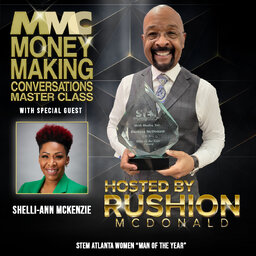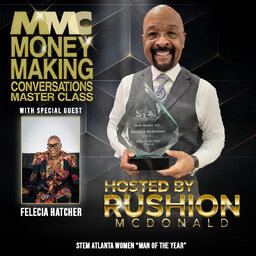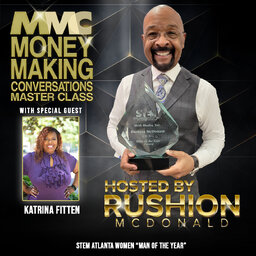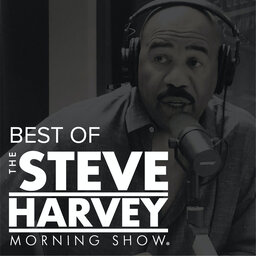Uplift: Randal's company provides insights about diverse people that lead to equity for all.
Listen and subscribe to Money Making Conversations on iHeartRadio, Apple Podcasts, Spotify, www.moneymakingconversations.com/subscribe/ or wherever you listen to podcasts. New Money Making Conversations episodes drop daily. I want to alert you, so you don’t miss out on expert analysis and insider perspectives from my guests who provide tips that can help you uplift the community, improve your financial planning, motivation, or advice on how to be a successful entrepreneur. Keep winning!
Two-time Emmy and Three-time NAACP Image Award-winning, television Executive Producer Rushion McDonald interviewed Dr. Randal Pinkett.
He has established himself as an entrepreneur, innovator, speaker, author, media personality and DEI expert who is leading the way in business, technology and equity for all. He is the co-founder, chairman and CEO of BCT Partners, a global, multimillion-dollar research, training, consulting, technology, and data analytics firm whose mission is to leverage diversity, insights and innovation to transform lives, accelerate equity and create lasting change. The company has been recognized by Forbes as one of America’s Best Management Consulting Firms, Ernst & Young as EY Entrepreneur of the Year, Manage HR Magazine as a Top 10 Firm for Diversity & Inclusion, the Black Enterprise BE100s list of the nation’s largest Black-owned businesses, and the Inc. 5000 list of the fastest-growing private companies in America.
Dr. Pinkett is an expert in several areas relating to emerging technologies, “big data” analytics, social innovation, culture, diversity, equity and inclusion (DEI), and is a regular contributor on MSNBC, CNN, and Fox Business News. An international public speaker, he is the author or co-author of several books including Black Faces in High Places, Black Faces in White Places, Data-Driven DEI, Campus CEO, and No-Money Down CEO. He holds five degrees including: a B.S. in Electrical Engineering from Rutgers University; a M.S. in Computer Science from the University of Oxford in England; and a M.S. in Electrical Engineering, MBA, and Ph.D. from MIT. Most notably, he was the first and only African American to receive the prestigious Rhodes Scholarship at Rutgers University; he was inducted to the Academic All-America Hall of Fame, as a former high jumper, long jumper, sprinter and captain of the Rutgers men’s track and field team; and he was the winner of NBC’s hit reality television show, “The Apprentice.”
Born in Philadelphia and raised in New Jersey, Dr. Pinkett is a proud member of Alpha Phi Alpha Fraternity, Incorporated and First Baptist Church in Somerset, NJ, where he resides with his family, including a daughter and two sons. Dr. Pinkett firmly believes that “for those to whom much is given, much is expected,” so throughout his endeavors, he places great emphasis on his responsibility to give back to the community.
Company Description *
BCT Partners’ mission is to provide insights about diverse people that lead to equity.
We are a national, multi-disciplinary consulting firm that delivers a full range of research, consulting, training, technology, and analytics services. BCT works with government agencies, corporations, nonprofit organizations, educational institutions and foundations, and is one of the leading firms in the country with expertise in the following markets: housing and community development, economic development, workforce development, children and families, health, education, and diversity, equity & inclusion.
We invite and welcome to our team people who share our values and goals; those with a passion for making the world a better place, who see strength in our diversity, seek equal opportunity for all communities and are motivated to create a more equitable and just society. We appreciate the knowledge, abilities, and ideas of each individual and embrace his/her/their positive contributions to our collaborative and dynamic work environment.
#BEST
#STRAW
#SHMS
In 3 playlist(s)
Money Making Conversations Master Class
Hi, this is Rushion McDonald. Welcome to the podcast world of Money Making Conversations Master Clas…Social links
Follow podcast
Recent clips

Mental Health Tips: Her goal is to highlight burnout, financial struggles, and systemic issues in healthcare industry.
24:46

Overcoming the Odds: She emphasizes resilience: “I’m a C student and a college dropout, but I never let that define me."
22:54

Business Tips: educates business owners—on how to secure funding responsibly, avoid scams, and develop a strategic financial plan.
22:10
 Money Making Conversations Master Class
Money Making Conversations Master Class

